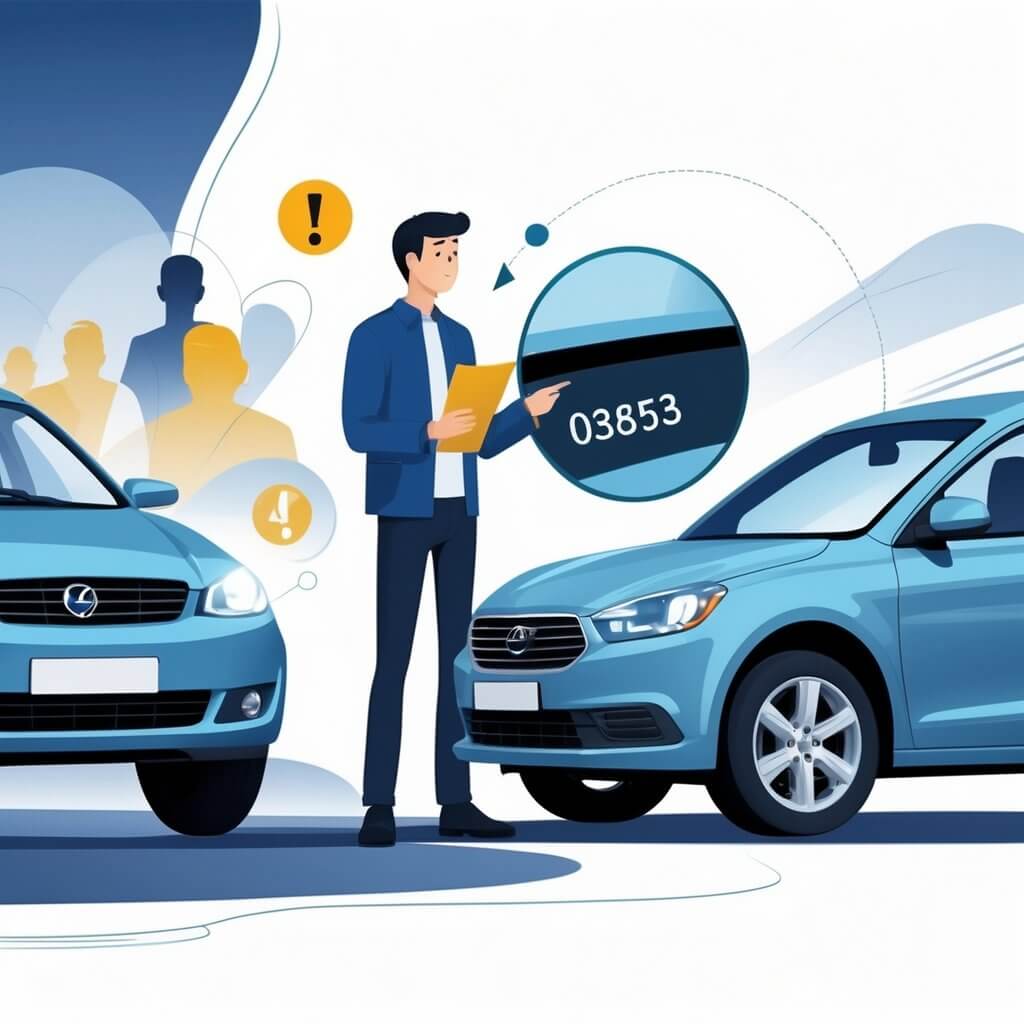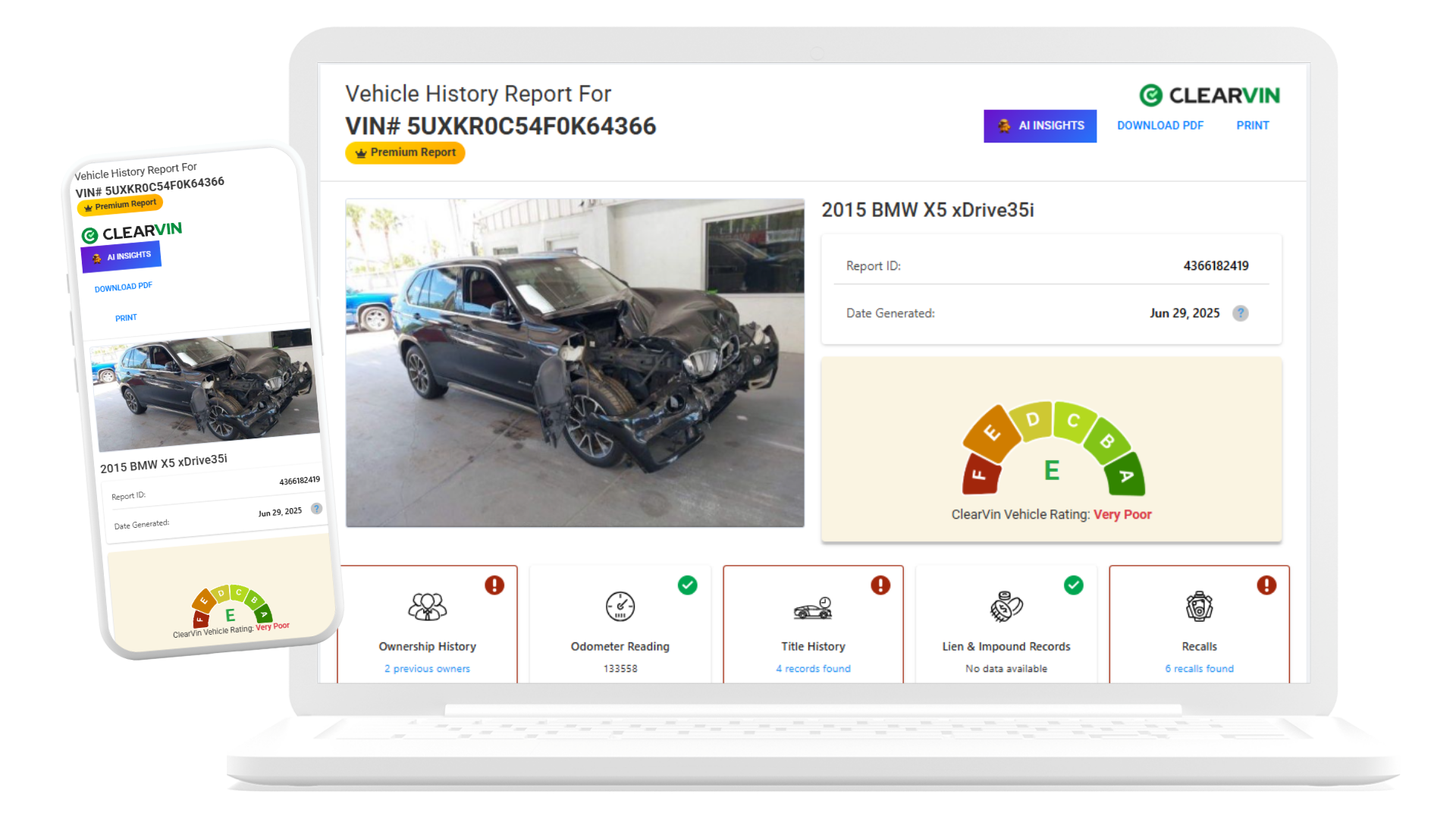
Why Buying a Car Without a VIN Check Increases Risks and Potential Costs
Shopping for a used car can be exciting, but failing to run a VIN check exposes buyers to serious risks and unexpected costs. A car without a verified history might look good on the surface but could hide accidents, theft records, flood damage, or legal complications.
This guide answers the most common questions about VIN checks, why they matter, and how they protect car buyers from making costly mistakes.
What is a VIN and why does it matter?
A Vehicle Identification Number (VIN) is a unique 17-character alphanumeric code assigned to every vehicle by the manufacturer. Think of it as a car’s fingerprint.
Information a VIN reveals
- Manufacturer and country of origin
- Model year and engine type
- Vehicle features and serial numbe
Who uses the VIN
Law enforcement, insurance companies, DMVs, and repair shops use VINs to track ownership, accidents, recalls, and service history. Without checking this identifier, you risk buying a car that isn’t what the seller claims.
How does a VIN check work?
A VIN check pulls records tied to the vehicle’s unique code from multiple databases. These include:
Types of records included
- Accident and damage reports
- Title history (clean, salvage, rebuilt, lemon, etc.)
- Odometer readings and mileage patterns
- Ownership transfers
- Flood or theft records
- Manufacturer recalls
Why cross-referencing is important
By cross-referencing this data, a VIN report highlights red flags that aren’t visible during a physical inspection or test drive..
Why is a VIN check important when buying a used car?
Skipping a VIN report leaves buyers vulnerable to:
- Fraudulent sellers using fake documents
- Cars with undisclosed accident damage
- Vehicles flagged as stolen
- Hidden liens or unpaid loans
Benefits of running a VIN check
A simple VIN check verifies that the seller legally owns the car and provides peace of mind before making a big financial decision.
What can go wrong if you skip the VIN report?
Common problems
- Undisclosed accident history – Cars may have structural damage or airbag deployments that aren’t obvious.
- Title issues – Salvage, rebuilt, or lemon titles reduce resale value and insurance eligibility.
- Flood damage – Water-damaged cars often look fine but hide electrical and mechanical failures.
- Stolen vehicles – Without checking the VIN, you could unknowingly buy a stolen car and lose both the car and your money.
How can a VIN check prevent fraud?
Fraud is common in the used car market. A VIN report helps detect:
- Odometer rollbacks – Sellers may illegally lower mileage to inflate value.
- VIN cloning – Stolen cars are sometimes given the identity of legal ones.
- Fake paperwork – A VIN check confirms whether documents match official records.
Protection against scams
This step protects buyers from scams that could cost thousands of dollars.
Can a VIN check reveal safety issues and recalls?
Yes. A VIN check shows whether the car has open recalls for safety defects like faulty brakes, airbags, or fuel systems. It also indicates whether the required repairs were completed.
Driving a car with unresolved recalls puts you and your passengers at risk, and may cause problems with registration or insurance.
Risks of ignoring recalls
Driving a car with unresolved recalls puts you and your passengers at risk, and may cause problems with registration or insurance.
How does a VIN check protect against title and lien problems?
A clean title is essential. A VIN report verifies whether the car has:
- Active liens (money still owed to lenders)
- Salvage or rebuilt branding
- Ownership disputes
Consequences of unresolved liens
Buying a car with unresolved liens could make you legally responsible for someone else’s debt—or cost you the car entirely.
What hidden problems can a VIN check uncover?
Even if the car looks great, VIN reports often reveal issues such as:
- Gaps in service records (poor maintenance habits)
- Patterns of frequent resales (a sign of recurring issues)
- Flood exposure in high-risk states
- Mileage inconsistencies that suggest tampering
Impact of hidden problems
These hidden issues can dramatically affect a car’s reliability and resale value.
How does running a VIN report save you money long-term?
A VIN check helps you avoid:
- Expensive future repairs from hidden accident damage
- Costly insurance premiums for risky vehicles
- Paying too much for a car with rolled-back mileage
ROI of a VIN report
Spending a small fee on a VIN report today can save thousands in repairs, fines, or legal issues later.
Which VIN check services are most reliable?
Popular options include:
- CARFAX – Strong accident and service record data
- AutoCheck – Auction and fleet history with unique scoring system
- VINspectorAI – AI-powered analysis with fraud detection, accident insights, and real market value checks
- Government databases like NHTSA (recalls) and NMVTIS (title and theft data)
Free vs. paid VIN reports
Free databases are helpful, but premium VIN reports provide the most complete picture.
Can you check a VIN number for free?
Yes, but with limitations. Free options include:
- NHTSA for recalls
- NICB for theft checks
- Some state DMV websites for title information
Limitations of free checks
These reports are often basic. For a full history—including accidents, service records, and ownership changes—paid services are more reliable.
How to get a VIN report step by step?
- Locate the VIN (dashboard, driver-side door jamb, or car documents).
- Go to a trusted provider’s website (e.g., VINspectorAI, CARFAX, AutoCheck).
- Enter the 17-digit VIN.
- Pay the fee (typically $25–$40 per report).
- Download and review the report before purchase.
Who should run a VIN check before purchase?
A VIN check is useful for:
- Private buyers – Protect against scams and hidden damage.
- Dealers – Build customer trust and avoid liability.
- Fleet managers – Ensure safety and compliance for multiple vehicles.
- Leasing and finance companies – Verify asset value before approval.
What happens if you buy a car without checking the VIN?
You risk:
- Buying a stolen or cloned car
- Facing denied insurance or registration
- Paying for undisclosed accident or flood damage
- Losing resale value due to salvage or branded titles
Cost of skipping a VIN check
Skipping this step often costs buyers far more than the price of the report.
Conclusion: Is a VIN check worth it?
Absolutely. A VIN report provides transparency, protects your investment, and ensures peace of mind.
Potential consequences of skipping this step include:
- Legal problems from stolen or liened vehicles
- Thousands in hidden repair costs
- Reduced resale value and insurance complications
Benefits of using VINspectorAI
With services like VINspectorAI, buyers get AI-powered fraud detection, comprehensive history reports, and smart analysis—all in minutes.
FAQ – Additional Questions About VIN Checks
Why should I run a VIN check before buying from a private seller?
It verifies ownership, uncovers hidden damage, and reduces the risk of fraud compared to buying without checking the car’s history.
Are VIN reports useful for dealers or fleet managers?
Yes. Dealers can build customer trust, and fleet managers can ensure safety and compliance across multiple vehicles.
Can a VIN check uncover flood or water damage?
Yes. VIN reports often include flood history, which may not be obvious from a visual inspection.
How can a VIN report protect me from legal issues?
It shows liens, theft records, and title problems, preventing you from being held responsible for another person’s debt or buying a stolen vehicle.
Do VIN checks include manufacturer recalls?
Yes. Reports from sources like NHTSA and VINspectorAI include all open and completed recalls, helping ensure vehicle safety.
How do paid VIN services differ from free ones?
Paid services provide detailed accident history, service records, ownership transfers, and fraud detection, while free reports are limited in scope.
Can VIN checks help determine a car’s resale value?
Yes. A clean history report with no accidents, fraud, or title issues increases the vehicle’s resale value, while problems reduce it.
How often should I check a VIN?
Check a VIN before buying a vehicle, and if considering resale or new ownership, running an updated report can help ensure continued accuracy.
Uncover Complete Vehicle History Reports
Discover critical vehicle information before you buy. Our VIN decoder reveals accident records, title status, recalls, and service history to help you make informed decisions.
Related Articles
Explore Tags
More from Automotive Technology

Explore the fascinating history of cars, groundbreaking innovations, and future trends like electric vehicles and autonomous driving. Discover how automobiles have transformed our world

Get a 100% free auto history check with VinspectorAI. No hidden fees. Uncover accidents, ownership, theft & more. Test our full AI analysis with a free demo!
Transparent VIN checks build trust in auto sales. Give buyers clear vehicle history reports & integrate checks for confident, informed car purchases.
